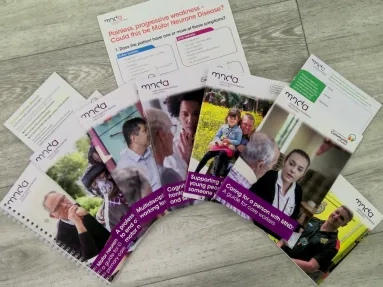
Our online learning modules are in depth courses which you can complete around your work commitments. They are developed with the input of a team of health and social care professionals and the involvement of people affected by MND.
Participants have found these courses interesting, informative and relevant to their practice.
Where appropriate the courses are endorsed by professional organisations – take a look and book your place.
New! - An introduction to MND for professionals
This course has been designed for all health and social care professionals who are new this condition. It covers what MND is, its symptoms and how they impact people with the disease and those close to them.
The course is available for free through OpenLearn at the link below.
It takes approximately three hours, but it can be completed at your own pace and in your own time.
Using Acceptance and Commitment Therapy (ACT) to support people with MND
People living with MND, as well as their carers and loved ones, face uncertainty, continuous losses and difficult decisions. For this reason, it's essential they receive the right support for their psychological wellbeing. The COMMEND study, partly funded by the MND Association and co-led by Professor Rebecca Gould from the Division of Psychiatry at University College London, has shown that Acceptance and Commitment Therapy (ACT) can improve quality of life for people affected by MND.
ACT is a form of psychological therapy that combines behavioural and motivational strategies to help people handle distressing thoughts and challenges. This online course will train you to provide ACT to support people with MND, and it includes both self-paced modules and live sessions delivered by Professor Gould.
The course will last for nine weeks. Participants will spend up to three hours per week doing the course, and will have an extra two weeks to complete any outstanding activities.
The next course will start on 5 May 2026.
This course is free and open only to psychologists. To register your interest, please email education@mndassociation.org with:
- your full name
- job title
- details of your professional registration as a psychologist.
Accessible research: supporting adults with capacity and communication challenges
This course provides guidance on how to include adults who may lack capacity and may have communication difficulties in ethically sound research. It will be of interest to researchers developing proposals, members of research ethics committees, and public or voluntary sector organisations with an interest in research.
The course is structured around four sections, covering the law and ethics, capacity and decision-making, adjustments and supports, and practice-based examples.
By the end of the course, you will have been introduced to the laws governing ethical research with people who may lack capacity, gained an understanding of the adjustments and supports that can be put in place, and completed a series of practice-based examples.
This course is based on guidance produced by the ASSENT project.
Royal College of General Practitioners
Motor Neurone Disease
This short course looks at clinical presentations, highlights how GPs can improve detection of the disease, and offers valuable advice on the palliative care needs of people with MND.
Motor Neurone Disease - Advanced Care
In this second course on Motor Neurone Disease, the four collections of signs and symptoms are examined in more detail, with a focus on management. With the use of case studies, potential treatment options are explored and approaches to end of life care are discussed.
Royal College of Nursing
This course is for any registered nurse, student nurse, health care assistant (HCA) or assistant practitioner, working in any health care setting or specialism. It is designed to offer you support in your care for people living with motor neurone disease.
Care worker module
The purpose of this module is to introduce care workers to the issues surrounding the care for people living with MND and discusses equipment and procedures they may encounter in this role.
Multidisciplinary working - making it effective for MND
In this module you will examine multidisciplinary working and consider its benefits and challenges. You will be encouraged to consider multidisciplinary team (MDT) working in your own work environment and to develop responses in your own practice and the wider team to enhance its performance. The course runs over nine weeks, three times per year.
The next course will start on 2 March 2026.


